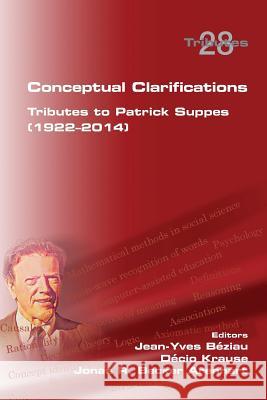Conceptual Clarifications. Tributes to Patrick Suppes (1922-2014) » książka
Conceptual Clarifications. Tributes to Patrick Suppes (1922-2014)
ISBN-13: 9781848901889 / Angielski / Miękka / 2015 / 246 str.
This is a volume containing papers honoring Patrick Suppes (1922-2014). All contributors have worked directly with Suppes or/and with his ideas. The book also contains one of the last papers by Suppes (co-authored by two of his collaborators). The work of Suppes touches many different areas, ranging from meteorology to physics, through logic, mathematics, psychology, neuroscience, education, painting, but he was first of all and above all a philosopher, always questioning, but not in vain. There are not many philosophers who can be proud of having written influential math textbooks, contributed decisively to the philosophical foundations of science, helped to develop research in real labs, promoted new forms o education (computer-assisted learning and the EGPY - Education Program for Gifted Youth). Since the range of interest of Suppes was very broad, so is the variety of topics dealt with in this volume. The work of a researcher is certainly not limited to his own writings, but also has to be appreciated through the work of the people he has been working with and influenced. From this point of view the work of Suppes is very impressive, and the present book contributes to show that. This is a follow up of a special issue of the journal Synthese, New Directions in the Foundations of Science, edited by Beziau and Krause, after a meeting they organized with Suppes in Florianopolis (Brazil) in 2002 for his 80th birthday. Jean-Yves Beziau worked with Suppes at Stanford University for two years (2000 and 2001) and has been continuously working in the Suppes tradition of logic, methodology and philosophy of science, which emphasizes structures and models. Decio Krause has used Suppes' approach to the axiomatization of scientific theories in many fields. With J.C.M. Magalhaes, he presented a "Suppes predicate" for genetics and natural selection and with S. French he developed a Suppes predicate for quantum field theories via Fock spaces."
This is a volume containing papers honoring Patrick Suppes (1922-2014). All contributors have worked directly with Suppes or/and with his ideas. The book also contains one of the last papers by Suppes (co-authored by two of his collaborators). The work of Suppes touches many different areas, ranging from meteorology to physics, through logic, mathematics, psychology, neuroscience, education, painting, but he was first of all and above all a philosopher, always questioning, but not in vain. There are not many philosophers who can be proud of having written influential math textbooks, contributed decisively to the philosophical foundations of science, helped to develop research in real labs, promoted new forms o education (computer-assisted learning and the EGPY - Education Program for Gifted Youth). Since the range of interest of Suppes was very broad, so is the variety of topics dealt with in this volume. The work of a researcher is certainly not limited to his own writings, but also has to be appreciated through the work of the people he has been working with and influenced. From this point of view the work of Suppes is very impressive, and the present book contributes to show that. This is a follow up of a special issue of the journal Synthese, New Directions in the Foundations of Science, edited by Béziau and Krause, after a meeting they organized with Suppes in Florianópolis (Brazil) in 2002 for his 80th birthday. Jean-Yves Béziau worked with Suppes at Stanford University for two years (2000 and 2001) and has been continuously working in the Suppes tradition of logic, methodology and philosophy of science, which emphasizes structures and models. Décio Krause has used Suppes approach to the axiomatization of scientific theories in many fields. With J.C.M. Magalhaes, he presented a "Suppes predicate" for genetics and natural selection and with S. French he developed a Suppes predicate for quantum field theories via Fock spaces.











